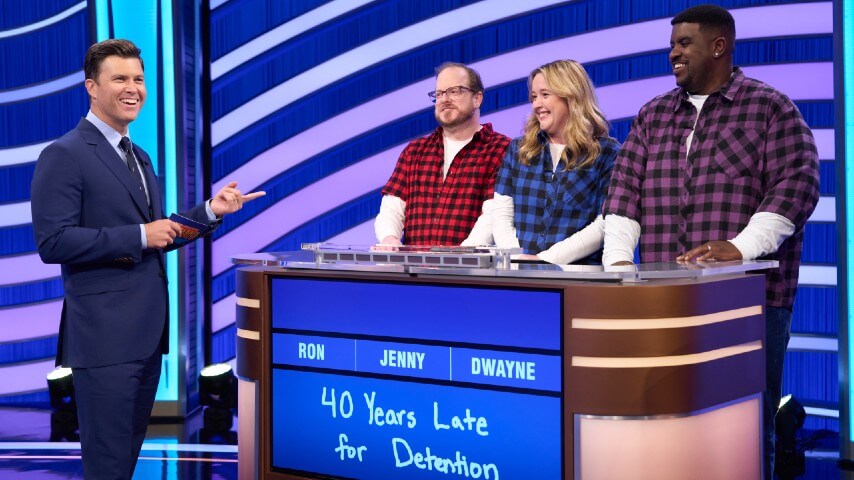Pop Culture Jeopardy! is a flat imitation of its predecessor
The spin-off is too gimmicky, not nearly geeky enough, and reeks of recency bias.
Photo: Greg Gayne/Amazon MGM Studios
You either grew up in a Jeopardy! household or you didn’t. The legendary quiz show created by Merv Griffin has been a television staple for sixty years, but for many of us, clicking over at exactly 7:00 p.m. from the dinner table to yell out answers like “Animal Farm!” and “The Galapagos!” in between bites of meatloaf and mashed potatoes is also a weeknight family tradition.
But what if, say, you lack savviness in most things science and all things math—with that brain space instead being dedicated to ’90s boy bands and the entirety of Tilda Swinton’s filmography? Enter Pop Culture Jeopardy!, the latest addition to the expanding Jeopardy! Cinematic Universe, which will test the cultural command of a whopping 81 teams—yes, teams—“in categories from Alternative Rock to The Avengers, Broadway to MMA, Gen Z to Zendaya as they compete in a tournament-style event for the grand prize of $300,000 and ultimate bragging rights,” or so says Prime Video, the home of the new Jeopardy! property. (The show premiered on December 4, with episodes mostly released in batches of three every week and 40 installments dropping in total.)
It’s far from the franchise’s first foray into overt populism: There was Sports Jeopardy! on Crackle with host Dan Patrick and Rock & Roll Jeopardy! on VH1 with Jeff Probst as emcee. And, of course, there’s still Celebrity Jeopardy! airing on ABC, which sees quick-minded famous folks like Patton Oswalt, Lisa Ann Walter, and Joel Kim Booster showcasing their smarts, albeit on admittedly less challenging clues than the brainy original. But Pop Culture Jeopardy! is thus far the brand’s most blatant appeal to the masses, though the subject matter does lean more chronically online than common core. It’s Jeopardy! but “for people who get upset when regular Jeopardy! players miss clues about rappers and reality TV,” proclaims host Colin Jost in the series premiere. (Speaking of, though pleasantly dry-humored, the funnyman can’t quite shake the feeling that he simply meandered over to the Jeopardy! lectern from the “Weekend Update” desk at Saturday Night Live.)
The idea of an entirely culture-focused quiz had this Jeopardy!-obsessed writer (whose grandmother appeared on the original show in the late 1980s) excited that the game was going to get real geeky and granular: all film-buff factoids and musical deep-cuts and obscure TV odds-and-ends you’d only know from watching countless DVD bonus features. But Pop Culture Jeopardy! doesn’t plumb the depths of its full geek potential, eschewing any esoteric corners of culture for mass-media moments like Left Shark, Dunder Mifflin, and the Met Gala. With categories stacked with TikTok trends and meme culture (“Famous Because The Internet,” etc.), there’s an air of recency bias permeating the Alex Trebek stage, a clear strategy to court a younger, techier demo. Even Jost seemed shocked that nine adult humans couldn’t name The Smashing Pumpkins’ most famous song and quipped about a category entitled “Back In 2019”: “I don’t like that it’s implying that was a long time ago.”
The game’s lack of intellectual rigor isn’t helped by the team-focused format. Again, how many extra brains does it take to drop some Game Of Thrones direwolf knowledge or accurately point out one of Flava Flav’s giant clock accessories? Their punny team names—the aforementioned premiere saw Oops! We Guessed It Again go up against the Pop Queens and the Queen City Kidz—and oft-coordinating outfits give the proceedings a pub-trivia vibe sprinkled with some Family Feud-style silliness, a departure from the scholarly earnestness of the original quiz show. That OG structure is further rattled by novel additions like the “Triple Play” twist, which requires teams to respond correctly to a three-part question or else have that points opportunity stolen by a competing trio. (Lack of audio and video clues also feels like a sorely missed opportunity, given the content.)
There are so few spaces remaining as is that take popular culture seriously, with twenty-second TikTok posts thriving in an age of puppy interviews and chicken-wing chats. Film and television are already considered lowbrow mediums when compared to more refined expressions like classical literature or opera, and the garish goofiness with which Pop Culture Jeopardy! treats them doesn’t help the argument that we’re dealing with “lesser” material here.
In a recent interview with The Ringer, Jost discussed watching original Jeopardy! episodes in preparation for hosting the pop-culture offshoot. “What I always realized, even before coming in there, is the game itself is really the star of the show,” the SNL alum noted. “It’s constructed so well that you just want to get out of the way. You don’t interrupt gameplay too much, and you want to get right into the game as quickly as possible.” This seems exactly the problem of Pop Culture Jeopardy!: Instead of letting it be exactly what it is—an unabashedly nerdy trivia enterprise that allows culture vultures to flex the full range of their respective geekdom—producers have bloated the game with so many bits and bobs that it’s nearly unrecognizable. Jeopardy! is perfect. Pop Culture Jeopardy! could be perfect, too, if its makers just got out of the way.
Will people watch it every Wednesday? Probably. The three-a-week format and the lighter, looser questioning make it an easy binge. (“Stay tuned for more…probably right now,” Jost jests at the end of the first episode, a cheeky acknowledgement of the ephemerality of streaming.) But it’s hard to see the same nightly ritualization, the same passed-down-through-generations enthusiasm happening around the spin-off as its long-running predecessor. Will kids grow up in Pop Culture Jeopardy! households? We’ll take “Doubtful” for $200, Colin.